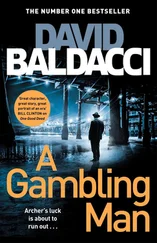“Are you sure something else wasn’t used? A rope, a metal bar, a board?”
“No, it was hands. Human hands. Even with gloves the evidence was pretty clear on that.”
“So a big, strong guy,” said Knox.
“Something more than that. It takes incredible force to do the damage we saw. The base of the spine was also crushed.”
Puller stared at him incredulously. “The spine was crushed? Do you know how difficult it is to break, much less crush? That could happen with a long fall or some kind of car accident.”
“I know exactly how difficult it is to crush a bone,” answered Lorne. “Because I researched it afterward. Not even an NFL lineman would be that strong. He could break it, sure, but pulverize it?” He shook his head.
Peckham added, “And it was the same with the blows to the head that killed some of the women. The marks indicated a fist was used. But the skull was crushed. And the ME didn’t think it was repeated blows. Only one .”
Knox stared at him in disbelief. “One blow to crush a skull! Are you sure some animal didn’t do this? You’re talking strength like a bear or something.”
“It was no animal. It was a human.”
“Well, it’s not any human I’ve ever run into,” retorted Puller.
“Not any human I’d ever want to run into,” replied Peckham.
“What about connections among the victims? We know they were all females, around the same age and professional types. But there weren’t detailed records on exactly what their professions were.”
Peckham said, “They all worked for government contractors.”
“That might tell us a lot about the perp, then,” said Knox. “He might have a beef against the government. He might have worked for the Feds or a contractor and been fired.”
Puller said, “I’m sure you followed that line of inquiry.”
“As far as we could.”
“Meaning what exactly?”
Lorne answered. “Meaning most of what those women did was classified and we couldn’t be ‘read into it,’ as they kept telling us. National security. That still means a lot today. Back then it scared the shit out of people. So we basically got zip on our inquiries because of that.”
“In a serial killer investigation!” exclaimed Knox.
“Trust me, I wasn’t happy about it either,” said Lorne.
The four people sat there and stared at each other for a long moment.
“Okay,” said Knox a bit breathlessly. “Where does that leave us?”
“I’m not sure,” admitted Peckham. “At square one, maybe.”
“What did the FBI conclude about all this?” asked Puller.
“I’m not sure what they concluded, because they never told us a damn thing. But I can tell you this.” He paused, apparently wavering whether to finish the thought or not.
“We really could use whatever help you can give us,” said Puller.
“Like you said, those women deserve justice,” added Knox.
Peckham glanced at Lorne, who nodded.
Peckham turned back to Puller. “The FBI was hot and heavy over this right from the start. They acted like the Feds always do. The eight-hundred-pound gorilla come in to take over the investigation. And the glory that comes with solving it. We were just poor shmucks from the backwaters of Tidewater.”
“Okay, and?” said Knox.
“And there came a day about three weeks after they’d joined the investigation where they pulled up their tent pole and went home.”
Knox and Puller exchanged a glance.
Knox said, “They just left?”
Peckham nodded. “Out of the blue. There one day, gone the next.”
Puller said, “And did they give you any reason for that?”
Peckham slowly shook his head. “I can tell you that the agents on the ground were pissed off. But there was nothing they could do about it.”
“And were they ever given a reason?” asked Knox.
“If so, they never shared it with us,” said Lorne. “But if you ask me, they got the same spiel we did.”
“National security,” said Puller, and Lorne nodded.
Knox said, “So presumably the orders came from higher up. Maybe as high up as the Hoover Building?”
Lorne shrugged. “I wouldn’t know about that. But about two months later I got a call from some high up muckety-muck at the FBI. He asked how things were going. I told him what I knew, which wasn’t much. Told him it didn’t look like we were going to crack this sucker.”
“And what was his reaction to that?” asked Puller.
Lorne licked his lips and started playing with the pen again.
“Detective Lorne?” prompted Puller.
Lorne looked up and let out a breath he’d been holding. “If you can believe it, the son of a bitch actually sounded relieved.”
FOUR PHOTOS.
Four dead women.
Puller stared at the pictures he had laid out on his bed at the hotel.
Was his mother the fifth?
Her throat crushed?
Her skull pulverized?
Never found?
Lying all these years in some makeshift grave?
He covered his eyes with his hands and tried to bring some calm to nerves that threatened to run away from him.
He had never felt this way on the battlefield. Certainly there was fear. Only a fool would not fear death while bombs and bullets were whirling all around like lethal snow. But his nerves had always held. That had allowed him to do his job as a soldier.
That had allowed him to survive.
He could not solve this case if his nerves would not hold.
He drew several long breaths and withdrew his hands and stared down at the pictures.
Victims of a serial killer usually had something in common. The killers picked their victims based on shared characteristics, at least in the person’s demented mind.
Young. Professional. Female. Three characteristics.
And national security. A fourth characteristic.
Lots of things were classified back then, just like today, Puller knew. If the Feds had stonewalled a homicide investigation, the work the women did must have been really important. But they had to work somewhere. The problem was that the Tidewater area was home to a huge military footprint and thus DoD contractors were all over the place like ants at a picnic and had been for a long time.
So how had the killer gone about hunting for them?
And why Williamsburg?
Was it because the killer was from there? Or because he had migrated there from some other place?
Puller looked at the background sheets on each of the victims. He read through the bios of the slain women.
An engineer, a biologist, a chemist, and a computer programmer. Where they had worked had been redacted from the files. Puller shook his head. That was unheard of. How could the police establish a connection if they had no idea where the women worked?
However, it had been determined that they didn’t shop or eat at the same places. They didn’t live in the same buildings. They didn’t get their cars repaired at the same shops. Two banked at the same bank, but that was all. This was before the era of smartphones and email, but hardline records showed no contact among any of the women.
If there was a common thread, it had escaped everyone’s attention.
But the obvious connection was the national security tag. Only they hadn’t been allowed to follow up that lead.
So maybe I should look at the case a different way, then. Not from the evidence. Not from the victims. But from the killer’s perspective.
That was far easier said than done.
Getting into the head of a psycho was not going to be pleasant.
He had looked down at the pictures again when his phone buzzed. It was Knox.
“Yeah?” he said.
“You didn’t say much on the trip back.”
Читать дальше








![Дэвид Балдаччи - A Gambling Man [calibre]](/books/384314/devid-baldachchi-a-gambling-man-calibre-thumb.webp)



